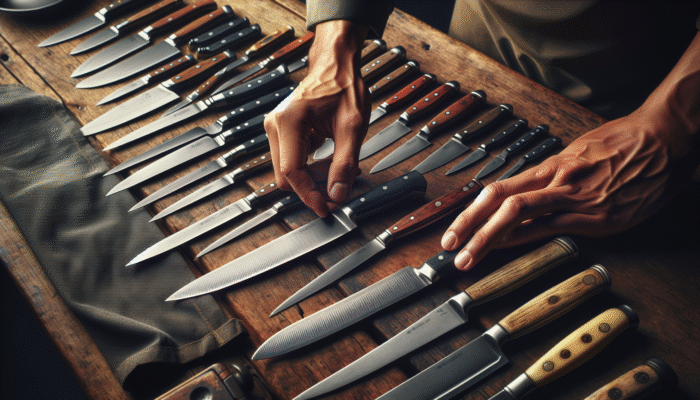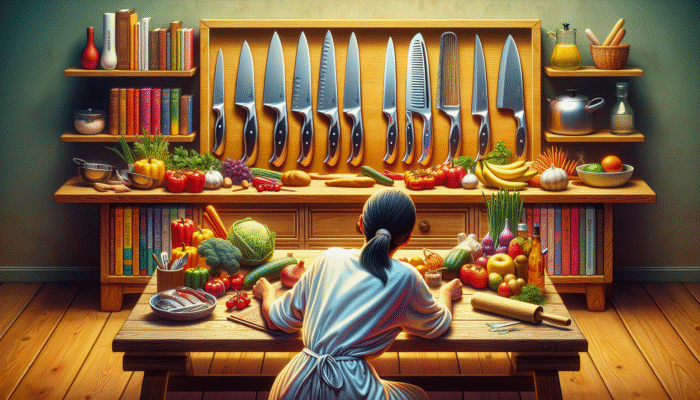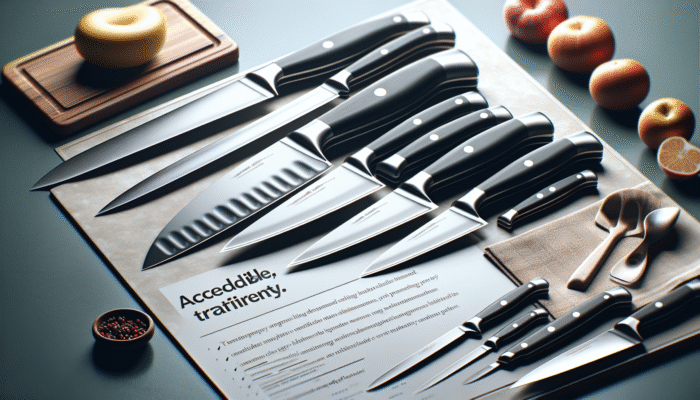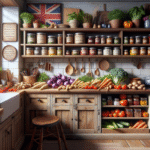Key Considerations for Choosing the Perfect Beginner Knife Sets
Discovering the Ideal Blade Material for Superior Culinary Performance

Embarking on your culinary adventure necessitates a careful selection of blade material, particularly when navigating the realm of top knife sets for beginner cooks. Many aspiring chefs may not fully appreciate how the choice of blade material can dramatically influence a knife's performance, longevity, and maintenance requirements. Stainless steel is a widely favoured option due to its exceptional resistance to rust and corrosion, making it an indispensable choice for any domestic kitchen. Alternatively, high-carbon stainless steel merges the advantages of both materials, offering remarkable sharpness, durability, and stain resistance, ensuring a reliable tool in your culinary toolkit.
Additionally, ceramic blades present an attractive option, distinguished by their lightweight design and superior edge retention compared to conventional steel choices. However, they also come with the caveat of being brittle and susceptible to chipping if mishandled. For those just starting out, it’s essential to strike a balance between durability and ease of use. Seek out blades that are highly recommended for their sharpness and robustness, as a well-crafted knife can significantly enhance your chopping, slicing, and dicing endeavours, ultimately transforming your cooking experience into a more enjoyable and efficient process.
Boosting Control and Safety with Ergonomically Designed Knife Handles
One crucial aspect that many novice cooks frequently overlook is the significance of knife handle comfort, which plays a vital role in the overall cooking experience. Ergonomically designed handles improve grip and control, effectively reducing fatigue during prolonged cooking sessions. When preparing meals, the last thing you want is to grapple with a knife that feels uncomfortable, which could lead to accidents and inefficient cutting practices.
Common materials used for knife handles include Pakkawood, rubber, or textured plastic, all of which provide a secure grip while ensuring safety during use. A well-designed handle not only enhances your control over the knife but also fosters proper cutting techniques, which are essential for beginners. It is wise to try out various knives and assess how they feel in your hand before making a purchase; remember, your comfort directly impacts your cooking efficiency and overall enjoyment.
Gaining a Comprehensive Understanding of Knife Set Composition
For beginners, having a well-rounded knife set is essential, as it should encompass fundamental knives tailored for a variety of kitchen tasks. A typical knife set composition includes a chef's knife, a paring knife, and a serrated knife. The chef's knife serves as the kitchen's workhorse, ideal for numerous tasks, such as chopping, slicing, and mincing. In contrast, a paring knife excels in delicate tasks like peeling and trimming, while a serrated knife is specifically designed for cutting through bread or tomatoes without crushing them, thus ensuring precision and ease.
When seeking top knife sets for beginner cooks, consider sets that also feature specialty knives, such as a boning knife or a utility knife, as these can significantly enhance your culinary skills. A thoughtfully curated knife set not only equips you for various cooking tasks but also boosts your confidence as you embark on your culinary journey, transforming cooking into an enjoyable and rewarding experience.
High-Quality Knife Sets for Beginners at Reasonable Prices

Striking the Ideal Balance Between Cost and Quality
Many novice chefs encounter the challenge of balancing cost and quality while shopping for kitchen tools. Although it may be enticing to splurge on premium knives, numerous budget-friendly options provide excellent performance and results. When exploring top knife sets for beginner cooks, focus on brands that offer durable materials and well-crafted designs at more accessible price points without compromising quality.
Conduct thorough research on various brands and peruse user reviews to identify sets that deliver the best value for your investment. Look for warranties as indicators of quality; reputable brands often stand by their products, demonstrating confidence in their durability. Investing in a slightly pricier set that promises enhanced longevity can result in long-term savings. A carefully selected knife set can enhance your cooking experiences without placing undue financial strain on your budget.
Evaluating Durability in the Knife Set Selection Journey
Durability is a vital factor when selecting a knife set, particularly if you are working within a budget. Knives that chip or dull rapidly are not worth any initial savings, as they will necessitate more frequent replacements. Seek out materials renowned for their strength, such as high-carbon stainless steel, which is less susceptible to wear and tear, providing a dependable companion in your kitchen.
The method of construction also plays a significant role in a knife’s durability. Forged knives, for example, tend to be sturdier than their stamped counterparts, making them a more sensible investment for beginners. It is beneficial to read reviews that focus on long-term user experiences to gauge the durability of various sets. Ultimately, investing in durable knives enhances your culinary journey, allowing you to concentrate on perfecting your skills rather than worrying about the reliability of your tools.
Understanding Brand Reputation in Your Knife Selection Process

Even when adhering to a budget, it’s crucial to contemplate the reputation of the brand. Certain manufacturers are well-regarded for producing high-quality kitchen tools at reasonable prices. Conduct comprehensive research on brands that consistently receive accolades from both cooking enthusiasts and professionals. Look for brands that are transparent about their materials and manufacturing processes, as this often correlates with overall quality and reliability.
Utilise online platforms and cooking forums to gather insights on beginner-friendly knife sets. The experiences shared by seasoned cooks can direct you towards reputable brands that provide dependable options for novices. Investing in a knife set from a trusted brand not only ensures quality but also instils confidence as you embark on your culinary adventures, empowering you to explore and develop your skills.
Essential Knife Maintenance Practices for Aspiring Cooks
Mastering Knife Sharpening Techniques for Extended Longevity
Acquiring knowledge of proper sharpening techniques is crucial for any beginner aiming to keep their knives in peak condition. Dull knives not only impede efficiency but can also pose significant safety risks, as users may exert excessive force, unintentionally increasing the likelihood of accidents. Beginners should familiarise themselves with various sharpening methods, including the use of honing rods and whetstones, to identify what works best for their specific needs.
Regular honing is essential for maintaining a blade's edge sharp between sharpenings, ensuring that your knives remain effective over time. When it comes to sharpening, investing in a high-quality sharpening stone can elevate your knife maintenance routine to a professional level. Beginners are encouraged to begin by viewing tutorial videos that illustrate the correct angles and techniques, transforming knife maintenance from a mundane chore into a valuable skill that enriches your culinary experience.
Implementing Proper Cleaning and Storage Techniques for Knife Longevity
Effective cleaning and storage practices are imperative for preserving the lifespan of your knives. After each use, it’s crucial to wash knives by hand rather than placing them in the dishwasher, which can damage the blades and handles. Employing warm, soapy water followed by immediate drying prevents moisture from causing rust or corrosion, particularly on stainless steel blades, which can be more susceptible to such issues.
In terms of storage, options range from magnetic strips to wooden blocks, each offering distinct advantages. Magnetic strips conserve counter space while allowing easy access, whereas knife blocks provide enhanced protection for your blades. Choose a storage solution that complements your kitchen layout and prioritises safety, minimising the risk of accidents and ensuring your knives remain in optimal condition for your culinary tasks.
Prioritising Safety When Using Knives in the Kitchen
Safety should always be a paramount concern for beginner cooks, particularly when handling sharp instruments like knives. Understanding how to use and care for your knives properly is essential in preventing accidents within the kitchen environment. Always cut away from your body, and ensure your cutting surface is stable to avert slipping hazards that could result in injury.
Utilising a cutting board is essential; it not only protects your countertops but also offers a safe, stable surface for cutting. Beginners should also be vigilant about keeping knives out of reach of children and pets, establishing a dedicated storage area for knife safety. Cultivating a strong safety mindset will enhance your overall cooking experience and help build confidence in your culinary skills as you progress.
Diving into Popular Styles of Knife Sets for Beginner Cooks
Classic Knife Sets: A Timeless Choice for Aspiring Chefs
Classic knife sets typically encompass a selection of essential knives, rendering them an excellent option for novice cooks eager to refine their skills. These sets frequently feature a chef’s knife, paring knife, utility knife, and a serrated knife, effectively covering most kitchen tasks with ease. Their traditional designs are often well-balanced and user-friendly, making them ideal for developing foundational cooking techniques.
Many classic sets prioritise high-quality materials, frequently utilising forged stainless steel for enhanced durability and edge retention. As you explore top knife sets for beginner cooks, consider the aesthetic appeal of traditional knives, which often feature stunning wooden handles that lend an elegant touch to any kitchen. Investing in a classic set can instil a sense of culinary pride as you advance through various cooking techniques, enriching your overall kitchen experience.
Contemporary Knife Sets: A Chic Option for Modern Cooks
Contemporary knife sets cater to modern aesthetics and technological advancements, appealing to a younger demographic of cooks eager to experiment. These sets often feature sleek designs, ergonomic handles, and vibrant colours that can enliven any kitchen. Many contemporary knives are crafted from high-quality materials that offer similar durability and sharpness to their traditional counterparts, making them an exceptional choice for beginners.
For a novice cook, a contemporary knife set can serve as an exciting gateway into the culinary world. They may also incorporate innovative knife shapes and sizes, enhancing versatility for various cooking styles. As you navigate available options, consider how the knife's design not only meets your cooking needs but also complements your kitchen decor, creating a cohesive and inviting culinary environment.
Specialty Knife Sets: Precision Tools for Unique Cuisines
Specialty knife sets concentrate on particular cuisines, making them an excellent choice for beginners who aspire to delve deeply into specific cooking styles. For instance, a Japanese knife set may include a <a href="https://limitsofstrategy.com/julienne-vegetables-like-a-chef-a-masterclass-guide/">Santoku knife</a>, celebrated for its versatility in preparing a wide array of dishes, or a Nakiri knife, which excels at slicing vegetables.
These specialty sets usually come with a carefully curated selection of knives essential for particular culinary techniques, aiding beginners in building confidence in their skills. They provide a unique opportunity to explore the intricacies of diverse cuisines while ensuring you possess the right tools at your disposal. Delving into specialty knife sets can ignite a passion for cooking and inspire creativity in the kitchen, transforming your culinary journey into an exciting adventure.
Affordable Knife Sets: Merging Quality with Budget-Friendliness
Affordability should never come at the expense of quality, especially for beginner cooks looking to equip their kitchens effectively. Budget-friendly knife sets are designed to deliver essential knives without straining your financial resources. These sets typically strike a harmonious balance between durability and performance, making them ideal for novice chefs.
When perusing top knife sets for beginner cooks, seek out sets that encompass a variety of knives, ensuring you have the necessary tools for a broad array of tasks. Many reputable brands offer affordable options that meet high-quality standards, enabling you to make a wise investment without overspending. Budget-friendly sets can lay a solid foundation for your culinary journey, encouraging experimentation and learning as you develop your cooking skills.
Essential Accessories to Enhance Your Knife Set
Knife Blocks: Organised and Secure Storage Solutions
Knife blocks function as both a practical storage solution and an aesthetic enhancement for your kitchen. They provide a safe, organised way to store your knives, significantly reducing the risk of accidental cuts while prolonging the lifespan of your blades. Many knife blocks are designed with slots tailored to accommodate specific knife shapes, ensuring that each knife is securely and conveniently housed.
Choosing a knife block that complements your kitchen style can elevate your cooking space visually while keeping your tools readily accessible. Some modern blocks even feature built-in sharpening mechanisms, allowing you to maintain your knives effortlessly. When investing in a knife block, consider the material and design, as these factors will impact both functionality and overall aesthetics in your kitchen environment.
Sharpening Tools: Essential Instruments for Knife Care
Investing in quality sharpening tools is critical for maintaining your knife set and ensuring its longevity. Whether you opt for a whetstone, honing rod, or electric sharpener, each tool has distinct advantages. A whetstone provides precise sharpening, catering to those who wish to refine their skills further. Meanwhile, honing rods are perfect for quick maintenance between uses, promoting efficiency in your cooking routine.
For beginners, tutorial resources and videos can be invaluable in effectively mastering sharpening techniques. Regular maintenance of your knives not only enhances their performance but also ensures safety during use, as dull knives can pose greater risks. By incorporating sharpening tools into your knife care routine, you cultivate an environment where cooking becomes more enjoyable and efficient, allowing you to focus on your culinary creations.
Choosing the Right Cutting Boards for Your Kitchen Needs
The right cutting board can significantly enhance your cooking experience, offering a safe and efficient surface for food preparation. When selecting a cutting board, consider factors like material, size, and maintenance requirements. Wooden boards, while aesthetically pleasing, demand more care to prevent warping and cracking over time. In contrast, plastic boards, often dishwasher-safe, offer convenience and ease of cleaning, making them a practical choice for bustling kitchens.
Size is also an important consideration; larger boards provide ample space for multiple tasks, while smaller boards may be more manageable for beginners. Opt for a cutting board that fits your kitchen space and complements your top knife sets for beginner cooks. By investing in a high-quality cutting board, you ensure a safer and more enjoyable food preparation process, ultimately enhancing your cooking experience.
Gaining Insights from User Reviews and Recommendations
Learning from Fellow Beginner Cooks: Valuable Experiences and Perspectives
The experiences of other beginner cooks can offer invaluable insights when selecting your knife set. User reviews frequently highlight crucial aspects such as comfort, ease of use, and durability that may not be immediately apparent from product descriptions. Engaging with cooking communities, whether on social media, forums, or review sites, allows you to connect with experienced cooks willing to share their knife journeys and the lessons they've gleaned.
Numerous beginners recount their stories of triumphs and challenges, providing guidance on what to expect from various sets. Reading about real-life experiences helps build confidence in your purchasing decisions and offers a clearer understanding of what works best in practical situations. Pay attention to recurring themes in reviews, as they can indicate which sets truly empower novice cooks to embark on their culinary adventures with enthusiasm.
Expert Insights: Gaining Knowledge from Culinary Professionals
Professional chefs and culinary experts regularly share their insights on knife sets, providing a wealth of information for beginners seeking to make informed choices. These experts focus on critical factors such as balance, edge retention, and the overall feel of the knives, all of which are essential for enhancing cooking skills and ensuring a pleasurable cooking experience. Reading expert reviews can guide you toward reputable brands and help you identify the key features to consider when selecting a quality knife set.
Many culinary schools and cooking publications conduct thorough evaluations of various knife sets, offering recommendations specifically tailored for beginner cooks. By incorporating expert opinions into your decision-making process, you can feel more assured in your choice, ensuring that you select knives that will support your culinary growth and development throughout your cooking journey.
Utilising Online Ratings for Informed Decision-Making
Utilising online resources to compare and select knife sets is an effective strategy for novice cooks looking to make educated choices. Platforms such as Amazon, culinary blogs, and YouTube channels provide extensive information through user ratings and reviews, helping you assess the quality and performance of various sets. Take the time to read both positive and negative reviews to gain a balanced perspective on each knife set's strengths and weaknesses.
Online ratings can also highlight essential features you may not have initially considered, such as a knife’s weight, balance, and overall ergonomics. Exploring these resources equips you with the knowledge needed to make an informed decision, ensuring that the knives you choose will serve you well throughout your culinary journey, enhancing both your skills and enjoyment in the kitchen.
Seeking Community Recommendations for Broader Insights
Cooking communities, whether on social media platforms or in person, can offer diverse recommendations when selecting a knife set. These communities are populated by passionate cooks eager to share their experiences and insights, making them a valuable resource for beginners. Engaging with these groups enables you to tap into a wealth of knowledge and discover lesser-known brands or models that may perfectly suit your needs, thereby broadening your understanding of the available options.
Participate in discussions, ask questions, and share your experiences to foster connections with other cooking enthusiasts. The recommendations you gather from these communities can help steer you towards the right tools, supporting your growth as a beginner cook and enhancing your overall culinary journey, transforming cooking into a delightful and rewarding experience.
Developing Key Knife Skills for Culinary Success
Mastering Fundamental Techniques: Cultivating Confidence in the Kitchen
As a beginner, mastering basic cutting techniques is crucial for building confidence in the kitchen. Familiarising yourself with fundamental skills such as chopping, slicing, and dicing can significantly boost your efficiency and safety while cooking. Start by refining your grip; a firm yet relaxed hold on the knife facilitates better control and precision, enabling you to execute your cuts more effectively.
Consider using vegetables like onions and bell peppers for practising various cuts; these ingredients offer varied textures that can aid in honing your techniques. Furthermore, investing time to learn how to julienne, chiffonade, or brunoise correctly can elevate both your cooking presentation and flavour profiles. As you enhance your knife skills, you’ll find that cooking becomes a more pleasurable and less intimidating experience, empowering you to explore new recipes and techniques with newfound confidence.
Prioritising Knife Safety for a Secure Cooking Environment
Understanding proper knife safety protocols is essential for any beginner cook. Knowing how to handle your knives safely can prevent accidents and injuries, making your cooking experience more enjoyable and productive. Always use a cutting board, ensuring it is stable to avoid slipping. When passing a knife to someone else, lay it down on a surface rather than handing it directly to another person, minimising any risk of accidents.
Be aware of your surroundings while cutting, and avoid distractions that could lead to mishaps. Cultivating a safety-first mindset will help you gain confidence as you develop your culinary skills. The more cautious you are, the more you’ll enjoy your time in the kitchen, ensuring that your cooking journey remains both productive and pleasurable as you hone your skills and creativity.
Engaging in Targeted Practice Exercises to Refine Your Knife Skills
Regular practice is fundamental to enhancing your knife skills and fostering confidence in the kitchen. Engage in simple exercises that focus on different cutting techniques, such as perfecting your grip or mastering the rocking motion with your chef's knife. Create a weekly schedule dedicated to honing your skills; consistency is crucial in developing proficiency and ensuring that you retain what you learn.
Challenge yourself with new recipes that encourage the use of various cutting techniques, allowing you to apply what you’ve practised in real cooking scenarios. As you practice, concentrate on maintaining proper movement and form to enhance efficiency and reduce fatigue. By incorporating regular practice into your cooking routine, you'll observe that your knife skills will steadily improve over time, rendering cooking a more enjoyable and fulfilling experience.
Frequently Asked Questions: Quick Insights for Beginner Cooks
What should I consider when choosing a beginner knife set?
When selecting a beginner knife set, prioritise blade material, handle comfort, and a comprehensive composition that includes essential knives, such as a chef's knife, paring knife, and serrated knife to effectively cover various cooking tasks.
Are high-priced knife sets worth the investment for beginners?
While expensive knife sets can provide superior quality and performance, there are many budget-friendly alternatives available that offer excellent durability and functionality, making them suitable for beginner cooks without overspending.
How often should I sharpen my knives?
Sharpening frequency depends on usage; generally, honing after a few uses and sharpening every few months is a good practice. Regular maintenance is crucial for prolonging the life of your knives and ensuring optimal performance.
Is it safe to put my knives in the dishwasher?
It's not advisable to place knives in the dishwasher, as this can damage the blades and handles. Hand washing with warm, soapy water is the most effective method for cleaning and maintaining your knives, ensuring their longevity.
What is the best way to store my knives?
Storing knives in a block, on a magnetic strip, or in a protective sheath helps keep them safe while preserving their sharpness. Avoid storing them loose in drawers, as this increases the risk of dulling and accidents.
How can I tell if my knives are dull?
If your knives struggle to cut through foods or require excessive force, they may be dull. A simple test is to slice through a tomato; if it squishes instead of cutting cleanly, it’s time to sharpen your knife for optimal performance.
What distinguishes a paring knife from a chef’s knife?
A chef's knife is larger and versatile, suitable for a broad range of tasks, while a paring knife is smaller and ideal for intricate tasks like peeling and trimming, enabling more precise cuts in smaller ingredients.
Are ceramic knives superior to steel knives?
Ceramic knives are lightweight and maintain sharpness longer but can chip easily if mishandled. Steel knives are generally more durable and versatile, making them a safer and more practical choice for beginners in the kitchen.
What makes a knife set beginner-friendly?
A beginner-friendly knife set includes essential knives, features ergonomic handles for comfort, and is crafted from durable materials, enabling new cooks to gain confidence in their skills while ensuring safety and efficiency in the kitchen.
How can I enhance my knife skills?
Improving knife skills involves consistent practice, learning basic techniques, and focusing on maintaining a proper grip and executing smooth cutting motions. Engaging with online tutorials can also be beneficial for visual learners seeking to enhance their proficiency.
Connect with us on Facebook!
The post Top Knife Sets for Beginner Cooks: Essential Picks appeared first on https://cookinggods.com
The Article Knife Sets for Beginner Cooks: Must-Have Selections Was Found On https://limitsofstrategy.com

